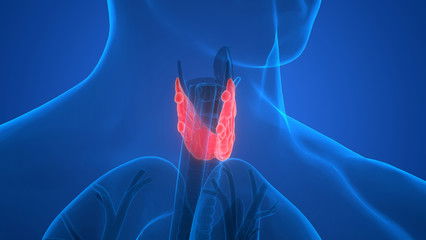The Thyroid

The Influence of the thyroid gland is both far-reaching and CRITICAL to normal body functions. It affects heart rate, cholesterol level, body weight, energy level, muscle strength, skin condition, vision, mental state and a host of other conditions. WE CANNOT FUNCTION/LIVE without thyroid hormone. Thyroid hormone influences essentially every organ, every tissue and every cell in our body.
HYPOTHYROIDISM
The most common type of thyroid disorder, hypothyroidism (underactive thyroid) occurs when the thyroid gland fails to produce enough thryoid hormone.
HASHIMOTO'S
Condition of the thyroid when the immune system produces killer lymphocytes that destroy the thyroid. As the damaged thyroid gland produces less thyroid hormones, the pituitary gland secretes more thyroid-stimulating hormone (TSH) to encourage the thyroid to work harder and harder. This increased demand on the thyroid may cause it to enlarge, resulting in what is commonly known as a goiter. If left untreated, the antibodies can attack the gland and destroy it thinking that it is foreign matter. Antibodies are produced that serve as a diagnostic test for Hashimoto's Autoimmune Disease. Doctors don't know what causes the immune system to attack the thyroid gland. Some think a virus or bacterium might trigger the response, while others believe a genetic flaw may be involved.
SIGNS AND SYMPTOMS
In the case of mild thyroid failure, patients often do not show obvious symptoms and may not even be aware of their condition. Left untreated, mild thyroid failure can progress to where symptoms begin to surface. Some of the signs and symptoms include: fatigue, horse voice, mood swings, difficulty swallowing, forgetfulness, intolerance to cold, dry coarse skin, hair loss, constipation, unexplained weight gain, pain and stiffness in joints and swelling of the knees or the small joints in your hands and feet, muscle weakness, especially in your lower extremities and depression. Many of these symptoms mimic menopause and the natural aging process. Many individuals remain undiagnosed and untreated for years due to their lack of awareness of hypothyroidism and without proper testing, there is no way to clearly diagnose the disease.